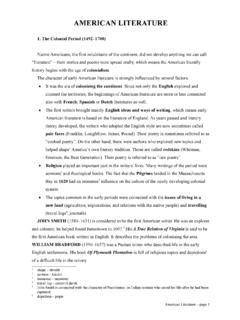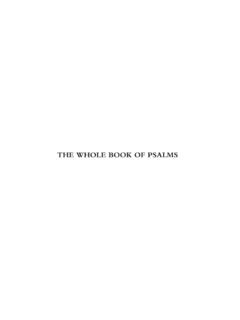Transcription of THE SEPTUAGINT: A CRITICAL ANALYSIS - …
1 THE septuagint : A CRITICAL ANALYSIS . Whosoever therefore shall be ashamed of me and of my words in this adulterous and sinful generation;. of him also shall the Son of man be ashamed when he cometh in the glory of his Father with the holy angels. Mark 8:38. 2000. 6th Edition Revised & Enlarged (First Edition 1989). FLOYD NOLEN JONES, , KingsWord Press P. O. Box 130220. The Woodlands, Texas 77393-0220. The septuagint : A CRITICAL ANALYSIS . Copyright 1989-2000 Floyd Nolen Jones Floyd Jones Ministries, Inc. All Rights Reserved. This book may be freely reproduced in any form as long as it is not distributed for any material gain or profit; however, this book may not be published without written permission. ISBN 0-9700328-4-6. ii TABLE OF CONTENTS. I. THE HISTORY OF THE LXX ..1. THE septuagint (LXX) .. 1. PROBLEMS AT THE 2. THE ORIGINS OF THE septuagint .. 3. THE TESTIMONY OF THE "STAR WITNESS" FALLACIOUS! .. 6. THE SCRIPTURES CONFRONT THE LXX'S "HISTORY".
2 7. THE QUALITY OF THE TRANSLATION .. 8. THE PRINCIPAL MATERIALS .. 9. DISCORDANT AGES OF THE PATRIARCHS IN THE 11. DISCORDANT LENGTHS OF KINGS REIGNS IN THE LXX .. 13. BIBLE CHRONOLOGY BASED ON HEBREW (TRUE) TEXT .. 14. CHAPTER SUMMATION .. 15. II. THE STATUS OF THE LXX ..17. THE HEXAPLA AND MESSIANIC 17. OTHER REVISIONS OF THE septuagint .. 19. THE "BIBLE" OF THE EARLY CHURCH? .. 20. AN EXTANT PRE-CHRISTIAN septuagint ? .. 21. WAS THERE ACTUALLY A PRE-CHRISTIAN ERA septuagint ?.. 22. IS THE APOCRYPHA THE CLUE TO THE TRUTH REGARDING THE LXX? .. 23. THE FAITHFULNESS OF THE HEBREW TEXT .. 24. III. THE AUTHENTICITY OF THE LXX ..27. DOES THE NEW TESTAMENT QUOTE FROM THE septuagint ?.. 27. A. DIRECT HEBREW - LXX COMPARISONS .. 27. B. IRREFUTABLE INTERNAL EVIDENCE .. 34. THE OBJECTION AGAINST THE HEBREW MASORETIC TEXT ANALYZED .. 35. WHY THEN DO CONSERVATIVES UPHOLD THE LXX? .. 37. A. TO DEFEND "VIRGIN" IN ISAIAH 7 37. B. TO ESTABLISH THAT THE ENTIRE WAS TRANSLATED.
3 38. LXX "PROOF TEXTS" FOUND 39. THE FALLACIOUS NATURE OF THE LXX DEMONSTRATED .. 41. THREE "PROBLEM" TEXTS IN THE BOOK OF HEBREWS .. 44. IV. THE LXX VERSUS GOD'S PROMISE ..47. THE BIBLE - A "SACRED" BOOK .. 47. WHAT DOES GOD HIMSELF PROMISE CONCERNING THE SCRIPTURES? .. 48. 49. FINAL CONSIDERATIONS .. 50. CONCLUDING 57. iii ABBREVIATIONS. A Codex Alexandrinus Anno Dei (Year of God). a Codex Sinaiticus - pronounced aleph, the 1st letter in the Hebrew alphabet AV Authorized King James Version (1611). B Codex Vaticanus b. born Before Christ BM British Museum c. circa - about; approximately ch.,chs. chapter(s). cp. compare D Codex Bezae d. died ed., eds. edition(s); editor(s). exempli gratia - for example et al. et alii - and others etc. et cetera - and so forth fl. floruit - flourished, used when birth & death dates are not known. fn. footnote gen. ed. general editor ibid. ibidem Latin for "in the same place". id est - that is ISBE International Standard Bible Encyclopedia KJB/KJ King James Bible (1611).
4 LXX septuagint , for the "70" (72) translators mss Greek ms of New Testament in small cursive letters. Also called "minuscules". MSS Greek MSS or Codex of the New Testament written in capital letters. Also called "majuscules" and "uncials". MS/ms A single uncial or cursive manuscript. MT Masoretic Text, the God given Hebrew Old Testament NASV New American Standard Version (Bible) - also shortened to NAS. Nestle26 The 26th edition of Nestle's Greek (same as Nestle-Aland26 or Aland-Nestle26). no date NIV New International Version no place; no publisher New Testament op. cit. opere citato Latin for "in the work previously cited". Old Testament p., pp. page(s). quod vide - which see (that is, see the preceding item). rev. revision; revised; revised; reviewed by rpt. reprint; reprinted [sic] so, thus TR Textus Receptus - the "Received Text". The Providentially preserved God given Greek Synonymous, for practical purposes, with "Traditional Text", "Syrian Text", "Byzantine", and "majority text" - although this is a simplification.
5 Trans. translated by; translator; translation Traditional Text - a text representing the "vast majority of authorities". UBS3 United Bible Society, 3rd edition of its Greek Vid. supra Vide supra - see above; previous pages or materials in the book one is reading. viz. videlicet - namely vol., vols. volume(s). vs., vv. verse(s). iv PREFACE. As in the case of the first writing (Which Version is the Bible?), it was not the author's intent to produce a book or even a manuscript on the subject of the septuagint . After years of study, materials had been assembled from numerous sources and places. That which began to take shape was a somewhat orderly assimilation of "private notes". These consisted of that which was regarded as the most pertinent information relevant to the question of textual criticism and Bible faithfulness, especially with reference to the role the LXX played in those matters. The only intent was to become better informed. The next phase consisted of typing the assimilated data into the computer's word processor for permanent storage.
6 This, of course, conferred the ability to add, rearrange, as well as make subsequent referral and retrieval expedient. This was important in order to facilitate locating essential material as, with the passing of time, it becomes easy to forget and/or misplace sources. Eventually, this loose information base evolved into a somewhat organized manuscript. Discussions on the matter with friends and acquaintances resulted in many of them requesting copies of my material, such as it was, so that they could further reflect on the subject and examine for themselves the resources I had gleaned from and studied. This prompted me to "clean" the notes up and make them a little more presentable (yet remaining in a somewhat unfinished rough form) so that upon request, copies of these personal notes could be sent out directly from the computer. However, it soon became apparent that this would not suffice for the material began to circulate beyond the realm of my familiars and the rather crude incomplete manner with which the footnotes had been left began to become an embarrassment.
7 Again, as no publication was to be the result of this endeavor, formal documentation with regard to footnotes, references, etc. was not always cited or complete. After all, the research had originally been intended merely for the benefit of the author. Thus, a more vigorous manuscript had suddenly become a necessity. To add to my discomfort, at the time this problem came to my attention I was deeply immersed in the preparation of a second doctoral dissertation and was thus unable to give immediate attention to the " septuagint papers". Upon completion of the treatise, the author was able to again turn his attention to the LXX and the third edition is the result of that return. Appreciation by the author is herewith gratefully expressed to the many on both sides of the issue from whom I have gleaned, compiled, and adapted information. The author trusts that if there remains any oversight in the acknowledgment of sources, such will be forgiven and accepted as being neither intentional nor with malice.
8 It is hoped that the unsuspecting church may, in at least some small measure, be alerted by the effort contained herein to that which has been afoot within the camp. For most, the resulting discoveries and conclusion will be startling. Floyd Nolen Jones December, 1994. v And it is easier for heaven and earth to pass, than one tittle of the law to fail. Luke 16:17. The grass withereth, the flower fadeth: but the word of our God shall stand for ever. Isaiah 40:8. vi I. THE HISTORY OF THE LXX. THE septuagint (LXX). The septuagint (LXX) is a very old translation of the Hebrew Scriptures (our Old Testament) into Hellenistic Greek. This statement alone is almost the only hard fact concerning this translation that is truly verifiable. In perusing the literature, the typical definition offered for the septuagint is that it was an "authorized" Greek translation of the Old Testament prepared in Alexandria, Egypt around 285-250. The enterprise is said to have been accomplished by 72 Jewish scholars at the request of Ptolemy II Philadelphus or possibly begun during the reign of his father, Ptolemy Soter.
9 Very serious and far reaching ramifications immediately follow this seemingly innocuous description namely, the ensuing assumption (1) and the conclusions that proceed (2 & 3):1. 1. There was a complete Greek translation of the Old Testament before the time of Christ Jesus. 2. This was the "Bible" actually used by the Lord Jesus and the Apostles. 3. Since this translation has the books of the Apocrypha interwoven into its fabric, its use by Jesus and the Apostles infers their endorsement of the Apocrypha. Thus, we see that the issue before us is threefold. First, the paramount question is not whether there was a very old Greek version of the Old Testament, but was it made prior to the time of Christ and the Apostles? Second, even if this should be true, did Christ Jesus and the Apostles actually use and/or quote from the Greek version at times in preference to the Hebrew Bible? Third, the crux of the matter is not whether we have extant ancient Greek witnesses to the Old Testament text, but rather do they represent an accurate translation of the original Hebrew text?
10 In addition, modern scholars inform us that there are three (some say four) families of Old Testament manuscripts. Most believe that all three must be compared in order to arrive at the original text. The three are the Hebrew Masoretic Text, the Samaritan Pentateuch, and the septuagint . All text critics feel that the LXX contains readings that have been lost or corrupted in the Hebrew Scriptures. Subsequently, these men hold that the septuagint may be used in determined places to "correct and restore" these adulterated readings. The late Dr. Ira M. Price is representative with regard to modern scholarship's position in Old Testament textual criticism when he states:2. ".. there are extant manuscripts of this version (the septuagint ) much older than any document of Biblical Hebrew that we possess, except a few fragments and the Isaiah scroll; and comparison of the age of the great manuscripts of the two traditions gives an advantage to the Greek of six or, perhaps we should say, of eight centuries.





